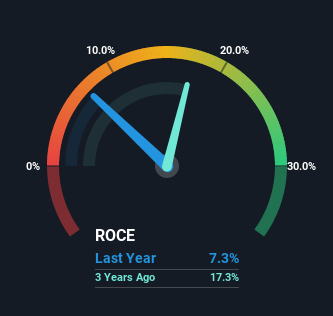Investors Could Be Concerned With Gattaca's (LON:GATC) Returns On Capital
What financial metrics can indicate to us that a company is maturing or even in decline? A business that's potentially in decline often shows two trends, a return on capital employed (ROCE) that's declining, and a base of capital employed that's also declining. Basically the company is earning less on its investments and it is also reducing its total assets. Having said that, after a brief look, Gattaca (LON:GATC) we aren't filled with optimism, but let's investigate further.
Return On Capital Employed (ROCE): What Is It?
Just to clarify if you're unsure, ROCE is a metric for evaluating how much pre-tax income (in percentage terms) a company earns on the capital invested in its business. The formula for this calculation on Gattaca is:
Return on Capital Employed = Earnings Before Interest and Tax (EBIT) ÷ (Total Assets - Current Liabilities)
0.073 = UK£2.6m ÷ (UK£90m - UK£54m) (Based on the trailing twelve months to January 2022).
Thus, Gattaca has an ROCE of 7.3%. In absolute terms, that's a low return and it also under-performs the Professional Services industry average of 15%.
See our latest analysis for Gattaca
Above you can see how the current ROCE for Gattaca compares to its prior returns on capital, but there's only so much you can tell from the past. If you'd like to see what analysts are forecasting going forward, you should check out our free report for Gattaca.
What Does the ROCE Trend For Gattaca Tell Us?
We are a bit anxious about the trends of ROCE at Gattaca. To be more specific, today's ROCE was 15% five years ago but has since fallen to 7.3%. What's equally concerning is that the amount of capital deployed in the business has shrunk by 63% over that same period. When you see both ROCE and capital employed diminishing, it can often be a sign of a mature and shrinking business that might be in structural decline. Typically businesses that exhibit these characteristics aren't the ones that tend to multiply over the long term, because statistically speaking, they've already gone through the growth phase of their life cycle.
While on the subject, we noticed that the ratio of current liabilities to total assets has risen to 60%, which has impacted the ROCE. Without this increase, it's likely that ROCE would be even lower than 7.3%. And with current liabilities at these levels, suppliers or short-term creditors are effectively funding a large part of the business, which can introduce some risks.
The Bottom Line On Gattaca's ROCE
In summary, it's unfortunate that Gattaca is shrinking its capital base and also generating lower returns. Unsurprisingly then, the stock has dived 72% over the last five years, so investors are recognizing these changes and don't like the company's prospects. That being the case, unless the underlying trends revert to a more positive trajectory, we'd consider looking elsewhere.
Gattaca does come with some risks though, we found 3 warning signs in our investment analysis, and 1 of those can't be ignored...
For those who like to invest in solid companies, check out this free list of companies with solid balance sheets and high returns on equity.
Have feedback on this article? Concerned about the content? Get in touch with us directly. Alternatively, email editorial-team (at) simplywallst.com.
This article by Simply Wall St is general in nature. We provide commentary based on historical data and analyst forecasts only using an unbiased methodology and our articles are not intended to be financial advice. It does not constitute a recommendation to buy or sell any stock, and does not take account of your objectives, or your financial situation. We aim to bring you long-term focused analysis driven by fundamental data. Note that our analysis may not factor in the latest price-sensitive company announcements or qualitative material. Simply Wall St has no position in any stocks mentioned.
Join A Paid User Research Session
You’ll receive a US$30 Amazon Gift card for 1 hour of your time while helping us build better investing tools for the individual investors like yourself. Sign up here

